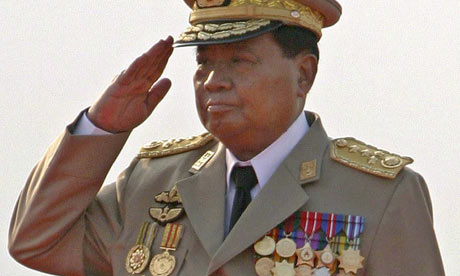Since 1996, military abuses have forced 1m villagers to flee their homes, according to UN draft report

General Than Shwe, leader of Burma's junta. Photograph: STR/EPA
• Since 1996, up to 1 million people have been displaced. Entire communities have been forced to relocate and their houses and food supplies burned to prevent their return. Those who refuse forced relocations and choose to hide risk military attack.
• More than 184,000 refugees in neigbouring countries originate from Burma. An estimated 2 million migrants are in Thailand. Thousands of ethnic Chin have crossed the border to the Indian state of Mizoram. Muslimresidents of northern Rakhine state continue to seek asylum in neighbouring countries.
• The presence and conduct of the military are central to the plight of these civilians. Military operations have placed a particularly heavy burden on rural populations affecting their ability to sustain livelihoods.
• There have been numerous and frequent reports of civilians being forced to serve as porters and guides for the military, to build and maintain roads, to construct military camps, and to labour for infrastructure projects.
• Cases of rape and sexual violence committed by military personnel, many of them against young girls and adolescents, have been reported by human rights organisations.
• In Shan state the military has burned down over 500 houses and scores of granaries since July 2009, and forcibly relocated almost 40 villages, mostly in Laikha township. Reports say more than 100 villagers, both men and women, have been arrested and tortured. At least three villagers have been killed. This would be the largest forced relocation since 1996-1998, when more than 300,000 villagers in southern and central Shan State were displaced.@ Battles between government forces and ethnic groups in Shan State in August 2009 and along the Thai border region in June 2009 have raised serious concerns about security both inside Burma and its spillover effects in neighbouring countries.
• There is serious concern about the continuing armed conflict in Kayin state, which severely affects the civilian population. It has been reported that in Hsaw Law Kho village, three villagers were killed and over a dozen more tortured by Infantry Battalion No 48 on 5 November 2009.
• The UN urges the government and all armed groups to ensure the protection of civilians, in particular children and women, during armed conflict. Recruitment of child soldiers, displacement of villagers, the use of anti-personnel landmines, and the forced labour of civilians should stop without any delay.

No comments:
Post a Comment